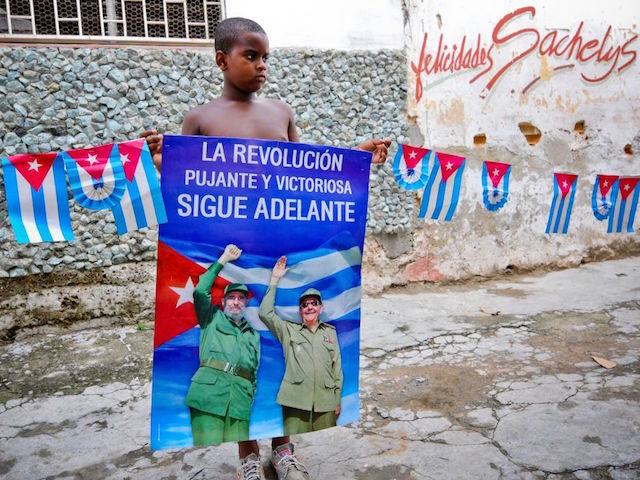Cubans living abroad with the blessing of their government “constitute an important pillar in the defense of the Nation, our culture, history, and values,” the communist Foreign Relations Ministry admitted in a press release published on its site Thursday.
The Castro regime’s admission that it is using Cubans allowed to live abroad to defend communism and spread the regime’s “values” follows months of controversy in Latin America as immigration officials in Chile, Bolivia, Brazil, and Ecuador have accused Cuban nationals of participating in riots, inculcating Marxist extremism, and otherwise acting as “cells” to destabilize conservative governments.
The revelation came in a press release announcing a conference titled “The Nation and Immigration” that will take place in April 2020 to discuss the role the communist regime can take in controlling and directing the voice of the Cuban diaspora. In the release, dated Tuesday, the Foreign Relations Ministry (Minrex) said the conference was necessary for the “deepening of ties with our citizens abroad.”
“Heirs to the traditions of struggle handed down by our forebears, Cubans residing abroad constitute an important pillar in the defense of the Nation, our culture, history, and values,” the release read. “In that sense, this [conference] will unite those Cubans who respect, love Cuba, defend it as free and independent and actively oppose the blockade imposed by the government of the United States.”
America has nominally kept an embargo on the Castro regime since the early 1960s in an attempt to starve the regime out of power, but it has largely failed as a result of Democrat presidents overriding the embargo to allow Americans to travel to the island, fund its businesses, and otherwise interact with the regime. In contrast, Cuba maintains a strict embargo against American business and culture entering the country, banning Cuban citizens who do not have connections within the regime from accessing concerts, luxury items, and academic exchanges with Americans. That embargo strengthened in 2014, limits the necessary goods that many Cuban exiles in America ship to their relatives – such as soap, glasses, and underwear – in response to President Barack Obama allowing some American companies to disregard the alleged American embargo and do business with the regime.
Minrex admits that Cuba once used emigration to win the “Necessary War” – exiling Cubans who did not agree with the brutal, deadly communism imposed by Fidel Castro – but that now Cubans abroad must help “preserve the nation before those who wish to deny it the right to exist as a sovereign nation,” implying that Washington seeks to annex Cuba.
Like other communist countries, Cuba treats all the world’s ethnic Cubans as Cuban citizens, meaning they are subject to the same repressive tactics used on the island if they find themselves under the control of regime officials. The regime reserves particular control for Americans of Cuban descent; an American born in America who has never visited Cuba is considered a Cuban citizen under Cuban law if their parents were born in Cuba.
The official newspaper of the Cuban Communist Party, Granma, claimed on Tuesday that Cubans living abroad with ties to the regime belong to “166 organizations existing in 79 countries, from which they defend the sovereignty of their fatherland” – that is, defend the communist regime – “and pronounce themselves against the embargo.”
The summit in April is the fourth of its kind – the first organized by Fidel Castro in 1978 as an attempt to regain control of young people in the exile community – and will take place shortly before that community has organized an unprecedented event in rejection of the Castro regime and its proxies in the region: America’s first-ever concert against communism.
Cuba’s economic and social collapse finalized in the 1990s after the fall of the Soviet Union, creating a near-constant demand to escape the island. Many do so by joining the regime’s athletic organizations or the Cuban slave doctor program, which sends thousands of poorly trained doctors around the world to offer health care for the developing world without receiving a salary. The host countries pay the Cuban regime for the doctors, but the doctors only see a meager living “stipend.” According to several Latin American countries, these doctors and their teams engage in political destabilizing activities to benefit Havana.
The government of Brazil, under conservative President Jair Bolsonaro, demanded this year that Cuba pay its doctors a living wage or no longer engage in the doctor trade with Brazil. Havana immediately withdrew its doctors, leaving a trail of evidence behind that Bolsonaro told reporters proved Cuba was building “guerrilla cells” of communists in the country.
Bolivia, following the resignation of socialist President Evo Morales, found similar evidence of political activity by Cuban doctors in the country. Amid the leftist riots that followed Morales’ resignation and flight to Mexico, Bolivian police arrested four Cuban nationals with bags of money after neighbors accused them of handing out cash to locals who rioted and burned down buildings. The Cubans claimed to work for the slave doctor program. Bolivia has since expelled hundreds of Cuban government agents allegedly working on the slave doctor program and accused outside agitators from Cuba and its colony Venezuela of instigating violence.
Chile similarly arrested and deported 30 Cubans present in the country illegally amid leftist riots in November, accusing them of participating in destructive activities against police and the state.

COMMENTS
Please let us know if you're having issues with commenting.